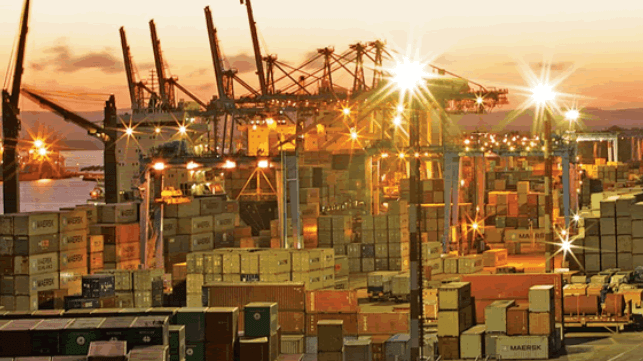Kenya to Commission New Mombasa Terminal Amidst Privatization Fears

Kenya is gearing to commission the second phase of a new container terminal at the port of Mombasa even as dark clouds hang over plans to bring on board a private company to operate the facility.
In the first week of April, Kenya will commission phase two of the second container terminal, constructed at a cost of $280 million. “The contractor is technically doing the final touches with commissioning expected soon,” said Bernard Osoro, Kenya Ports Authority (KPA) head of corporate affairs.
He added the new facility, which has been financed through a loan from Japan International Cooperation Agency, is undoubtedly the best in East and Central Africa and is bound to elevate the status of Mombasa port as the preferred gateway into the region.
The project is being implemented by Japan’s Toyo Construction Company, and it is part of the Mombasa Port Development Programme, which aims to enable Mombasa port to attract and accommodate larger vessels of 20-60,000 DWT.
“It is a modern terminal that significantly increases the handling capacity of Mombasa port and will be operated with state-of-the-art equipment,” said Osoro.
The new container terminal will help shield Mombasa port from increasing competition from other ports in the wider eastern Africa region. Mombasa port, which is the gateway for landlocked countries like Uganda, South Sudan and Rwanda, is facing stiff competition from other regional ports like Dar es Salaam, Djibouti and Berbera.
However, new plans to bring on board a private operator at the terminal are highly controversial. The Japanese government, which has funded the second container terminal project, has been pushing for a private operator to be awarded the concession to run the facility.
Though the indications are subtle, it is believed that the Japanese government would prefer a Japanese company to operate the terminal. This is a sensitive question with recent precedent: China pushed the Kenyan government to pick a Chinese company to operate Kenya's new standard gauge railway, which was financed with Chinese loans.
Plans to bring on board a private operator to run the new terminal have brought opposition not only from Kenya's Dock Workers Union but also from local leaders over fears that it will lead to job losses.
In 2015, KPA put out tenders seeking for a private company to run the terminal for a 25-year concession with global entities like China Merchant Holdings, APM Terminals, DP World, Cosco Pacific, Bollore Logistics, Grup Maritim TCB, Mitsubishi Corporation and Freight Forwarders Kenya, among others.
KPA did not award the contract and has since opted to remain mute on the question of the terminal concession.
“Dock workers and other stakeholders are not really opposed to bringing on board a private operator to run the facility, they just want to be involved in the discussions and modalities,” said Osoro.
He added that private sector involvement in port operations is not a new phenomenon, considering that KPA works in partnership with private companies in the handling and storage of bulk cargoes like clinker, cement, grain, soda ash and crude oil, among others.

that matters most
Get the latest maritime news delivered to your inbox daily.
“It is only the area of container handling that we have not touched. Currently KPA is running all the container terminals,” he said.
Once fully operational, phase two of the second container terminal will add 450,000 TEU capacity to the current 1.6 million TEU capacity at Mombasa Port. To ensure the facility operates seamlessly, KPA has invested $17 million to acquire a multipurpose salvage tugboat and $29 million to purchase three ship-to-shore gantry cranes.
